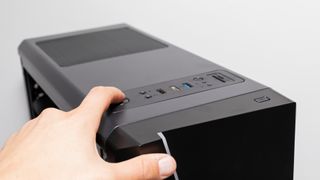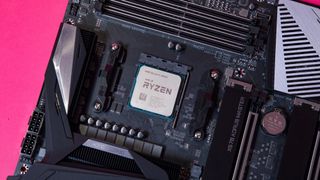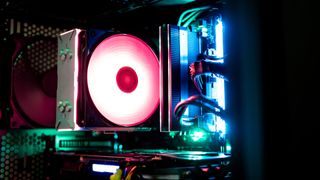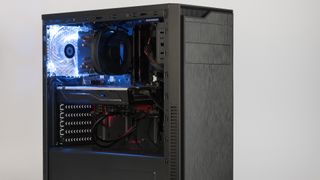Are desktop PCs dead?
Computer says no…

Desktop PCs are dead, or at least dying. This is a claim that, rather ironically, won’t die in itself, and we’ve regularly been hearing these kind of assertions throughout the last decade or so. Every now and then another article or opinion piece will surface tolling the bell for the humble desktop.
So we thought we’d re-examine the picture as of 2021, and consider what kind of health the desktop PC market is in right now. Are there any signs that these trusty machines are finally being pushed towards extinction and are perhaps in danger of dying, as many pundits have claimed in recent history?
The short answer remains a curt ‘no’, but the longer answer and in-depth discussion follows.

Fresh growth
Any evaluation of the state of the desktop PC arena needs to look at the latest sales figures, and the market is booming right now – it’s pretty much on fire, in fact. This year and last have seen a big uptick in overall PC sales, and while a lot of buyers have been picking up new laptops, desktop computers have been gathering serious momentum as well.
Indeed, in the most recent figures we’ve reported on from IDC, the analyst firm found that in Q2 of 2021, “elevated demand for PCs combined with shortages that greatly impacted the supply of notebooks led to desktop growth outpacing that of notebooks during the quarter”.
Gartner, too, observed that in the second quarter of 2021, it was a global trend that “desktop PCs saw stronger growth than mobile PCs [laptops]”, and the likes of Dell witnessed desktop computers secure “particularly strong growth”, actually in excess of 40% better than Q2 last year (compared to single-digit growth for laptops).
Of course, this current desktop PC surge is in part down to the aforementioned component shortages interfering with laptop supplies, but the fact remains that sales are strong. The other glaringly obvious caveat, though, is the pandemic spiking hardware sales in general as many more folks work from home, requiring new devices (or upgrades) to do so.
Get daily insight, inspiration and deals in your inbox
Get the hottest deals available in your inbox plus news, reviews, opinion, analysis and more from the TechRadar team.
While there’s impressive growth currently, then, there are unprecedented reasons for it. Still, this sales spike is very much larger-than-life right now, and with a good deal of folks likely to continue working from home in the future, or shifting to a model of hybrid working (remaining remote working to some extent), this demand is not likely to go away. That said, IDC does observe that the growth surge is trailing off somewhat, and there are some early indications of “consumer demand slowing down as people shift spending priorities after nearly a year of aggressive PC buying”.
At any rate, pandemic-fueled sales aside, looking to recent times before coronavirus hit, IDC reported that over the course of 2019, PC shipments grew by 2.7%, ending a run of seven years of market contraction. The analyst firm said in a press release: “This year [2019] was a clear sign that PC demand is still there despite the continued insurgence of emerging form factors and the demand for mobile computing.”
So there you have it. Given these figures, the desktop PC most certainly isn’t dead or dying, even if you roll back the sales charts to pre-pandemic times.

Chutes and ladders
Of course, while the PC industry might be in good health in recent times, this wasn’t always the case historically. All that talk of the PC dying didn’t come from nowhere, naturally.
If you cast your eyes back over the past decade, there have been times when PC sales were wobblier, rather up and down, or even seriously shaky. There’s a good reason for this, though: namely that as time has progressed, PCs have made considerable progress on the life expectancy front.
As hardware components, primarily processors, have become more powerful over the years, they’ve rather outpaced software and games. Meaning that as time marches on, any given chip is good and can run most things just fine for an increasingly longer duration. This, in turn, means folks don’t need to upgrade their PC as often, which obviously has a dampening effect on sales.
Crucially, though, the impact of this can only be felt so much, because there is still a steady enough flow of demand and upgrading activity. And for that matter, as we’ve seen in recent times, an entire reversal of the situation with a turnaround in demand, even before the pandemic.
There are a number of good reasons why desktop PCs have been, and remain, a wanted computing commodity, so let’s explore those points next.

Why are desktop PCs sticking around like glue?
In any debate about the staying power of the PC, one of the central thrusts of an argument that these desktop beasts won’t be dying off anytime soon will inevitably be the necessity for these kind of machines to handle certain heavyweight tasks.
If you’re into, say, video editing, or 3D rendering, the PC offers unrivalled performance that you just can’t get from a laptop (or any portable device). This is simply a matter of size and form factor, temperatures and cooling. There’s no way a giant top-tier graphics card can fit into a notebook, or more to the point, for multiple powerful and power-hungry components to be kept cool without a big airy case and some seriously sizeable fans (or indeed a labyrinthine liquid cooling system).
Power users looking to tackle heavyweight computing tasks and run multiple demanding apps will always need the beefiest PC going, and that’s a desktop, possibly with a multi-monitor setup to boot.
Much the same is true for gamers. Sure, you can get some impressively powerful gaming laptops these days, but if you want the speediest rig, offering the fastest frame rates – not to mention a big 4K (or ultra-wide) screen – it’s the same deal with the components, cooling and space offered by a big old PC case. You’ll need that for enthusiast-level overclocking, too.
Another compelling consideration is that desktop PCs simply offer much more bang for your buck. With a laptop, you’re paying for the privilege of the manufacturer packing smaller components into that slim chassis. Desktop PCs are just a straight-up better value proposition, and you can see this by looking at the spec of any laptop, and getting the same components in a desktop, then comparing the price (although exorbitant cutting-edge desktop GPU price tags are making any gap closer than it normally is, right now, but that situation shouldn’t last with any luck).
Of course, with a desktop PC you also get the flexibility to be able to choose exactly which components you want, and not just pick from a short list of a few options (if any). And if you’re buying standalone pieces of hardware to build your own PC, that works out even cheaper – not something you can do with a notebook, obviously. Customization options are endless with a desktop machine.
Not only that, but the versatility of the desktop is an obvious plus point when it comes to upgrading. If your graphics card starts to feel behind the times playing the latest games, simply swap it out for a newer model. That can give your PC a whole new lease of life for several years. Similarly, if a component goes wrong in a desktop computer, it’s (generally speaking) relatively easy to switch it out for a replacement part.
With laptops, when it comes to upgrades or repairs, you’re very often left in the lurch. Many portables don’t offer any realistic way to perform either of these feats, at least not yourself, with components all being soldered directly onto the motherboard. Some notebooks allow for upgrading the system RAM or storage, but that’s about as good as it gets usually. Otherwise, in the case of faults, you’re looking at an expensive third-party repair, or buying an entirely new device; the latter can sometimes make more financial sense than the former, sadly.

Are desktop PCs dead?
For all the above reasons, and looking at the current climate of PC sales – or even pre-pandemic shipment levels – the answer seems pretty clearly to be no, desktops aren’t dead, dying, or even sickly for that matter.
As we move forward into the future, it’ll likely be the case that the desktop PC once again flirts with troughs in terms of sales, and the kind of ups-and-downs or wobbly patches we’ve seen over the past decade. However, while sales may dwindle, they won’t die.
The desktop PC is just too important for those who really need a seriously powerful machine to meet their needs – content creators, professionals whose computing time directly translates to money, and gamers who need the kind of power on tap to have a crack at 4K all-bells-and-whistles or high refresh rate gaming. Not to mention people who want to build their own rigs, and have full control over the spec of their PC, and the potential to upgrade (or repair) it going forward. In short, the ability to get the most for their money.
In the longer-term future, the situation around desktops could eventually change, most likely due to a continued shift to a cloud-based PC, or ‘PC as a Service’ model, where users may be able to tap into all the power they need remotely, and ‘stream’ their desktop (like game streaming, and speaking of which, Shadow already offers a complete cloud PC solution). There could be other issues around that transition, though, in terms of control, privacy and security, not to mention shifting demands to your net connection, and the internet infrastructure required to make all this work widely and slickly.
For now, though, and certainly for the foreseeable future, the desktop PC remains in good health. It’s not going anywhere, anytime soon.
Darren is a freelancer writing news and features for TechRadar (and occasionally T3) across a broad range of computing topics including CPUs, GPUs, various other hardware, VPNs, antivirus and more. He has written about tech for the best part of three decades, and writes books in his spare time (his debut novel - 'I Know What You Did Last Supper' - was published by Hachette UK in 2013).
